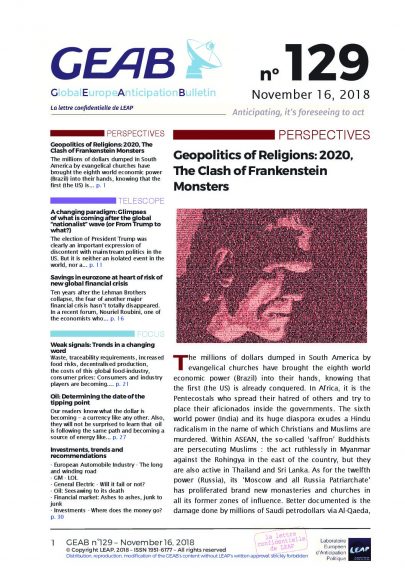GEAB 129
Ten years after the Lehman Brothers collapse, the fear of another major financial crisis hasn’t totally disappeared. In a recent forum, Nouriel Roubini, one of the economists who had anticipated the 2007-2008 crisis, announced for 2020 the possibility of a new financial crisis, plunging the global economy into recession. For him, all the ingredients of this scenario are being met: a new rise in interest rates (with very few or no leeway for the central banks once the crisis occurs), a high private and public debt and excessive stock market pricing.[1]
Growth still structurally weak and supported by bubbles
This analysis shows the weakness of a global economy which has never really been able to recover after the financial crisis ten years ago. Certainly, growth in the United States has been steady since mid-2009, which makes this the second-longest period of expansion after 1991-2001.[2] As for the unemployment rate across the Atlantic, it is at its lowest since 1969.[3] But in both cases, these records are misleading. Despite the surge of the past nine years, US growth has long remained lower on average than during earlier periods. It has been 2.3% over the last nine years against 4.15% between 1991 and 2001.[4] Similarly, in terms of employment, the very low unemployment rate should not obscure a labour market participation rate that is two points lower than in 2006. In 2016 the number of hours worked in the United States was higher by 4.2% compared to 2007. Essentially, then, the decline in unemployment has come about as a result of shared working hours and hence insecurity. Consumption growth in the US has been fuelled by a continued drop in the savings rate and an increase in household debt, which, at the end of 2018, will reach a record high of $4 trillion, representing 26 % of gross disposable income.[5]
Login

The millions of dollars dumped in South America by evangelical churches have brought the eighth world economic power (Brazil) into their hands, knowing that the first (the US) is already [...]
We hereby inaugurate a series of articles by the title « Changing paradigm » aimed at anticipating the different economic and political models that are emerging on the horizon of the new [...]
The Food Blockchain Waste, traceability requirements, increased food risks, decentralised production, the costs of this global food-industry, consumer prices: Consumers and industry players are becoming increasingly demanding about transparency within [...]
Our readers know what the dollar is becoming – a currency like any other. Also, they will not be surprised to learn that oil is following the same path and [...]
– European Automobile Industry – The long and winding road
– GM – LOL
– General Electric – Will it fail or not?
– Oil: Seesawing to its death
– Financial market: Ashes to ashes, junk to junk
– Investments – Where does the money go?
Convinced that the emissions scandal is now behind it, the German automobile industry is ready to restart. VW (Volkswagen), for instance, lined up 440,000 vehicles in October (compared to the 310,000 last August). But two markets are about to escape VW – and not the least important …

Comments